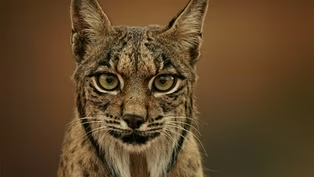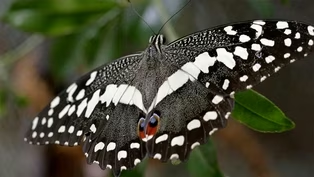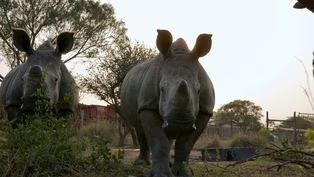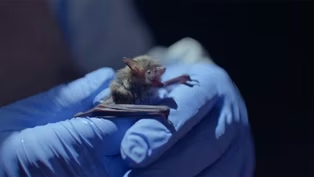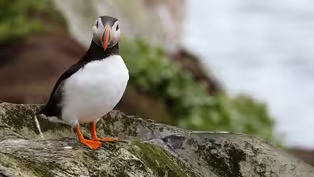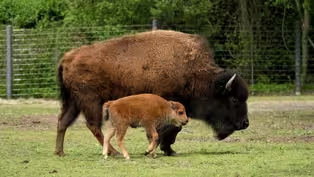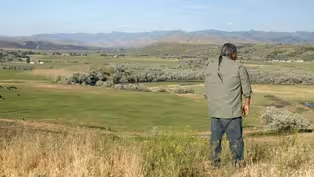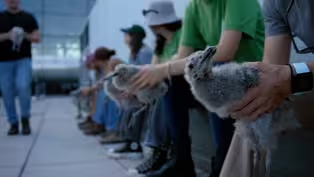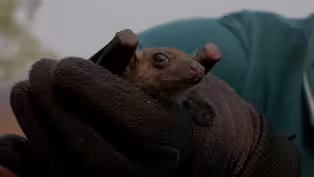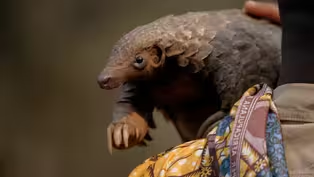
Rewilding Rio | WILD HOPE
Special | 14m 37sVideo has Closed Captions
What happens when animals return to Rio’s largest urban park?
In the middle of Rio de Janeiro sits the world’s largest urban rainforest: Tijuca National park. To combat a century of deforestation and hunting, a team of researchers are repairing the forest’s forgotten web of life, one species at a time.
Problems playing video? | Closed Captioning Feedback
Problems playing video? | Closed Captioning Feedback
Major support for NATURE is provided by The Arnhold Family in memory of Henry and Clarisse Arnhold, Sue and Edgar Wachenheim III, The Fairweather Foundation, Charles Rosenblum, Kathy Chiao and...

Rewilding Rio | WILD HOPE
Special | 14m 37sVideo has Closed Captions
In the middle of Rio de Janeiro sits the world’s largest urban rainforest: Tijuca National park. To combat a century of deforestation and hunting, a team of researchers are repairing the forest’s forgotten web of life, one species at a time.
Problems playing video? | Closed Captioning Feedback
How to Watch Nature
Nature is available to stream on pbs.org and the free PBS App, available on iPhone, Apple TV, Android TV, Android smartphones, Amazon Fire TV, Amazon Fire Tablet, Roku, Samsung Smart TV, and Vizio.
Buy Now
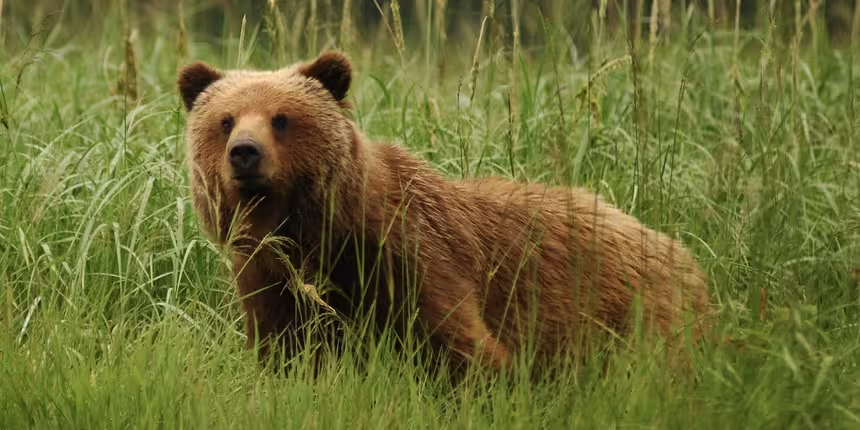
Explore More Ways to Watch
Bring the beauty and wonders of wildlife and natural history into your home with classic NATURE episodes.Providing Support for PBS.org
Learn Moreabout PBS online sponsorshipMore from This Collection
WILD HOPE is a new series of short films that highlights the intrepid changemakers who are restoring our wild places and sparking new hope for the future of our planet.
Video has Closed Captions
Once on the brink of extinction, the Iberian lynx has been given a chance to thrive again. (17m 23s)
The Butterfly Effect | WILD HOPE
Video has Closed Captions
To help stop the rise of deforestation in Zanzibar, one village has begun to farm butterflies. (12m 24s)
Video has Closed Captions
How does a densely populated nation like Singapore transform into a lush green oasis? (14m 51s)
Video has Closed Captions
For decades, rhinos have been the face of poaching. (16m 28s)
Video has Closed Captions
As a deadly fungus devastates North America’s bats, scientists are testing new ways to save them. (14m 47s)
Video has Closed Captions
In the Westman Islands, one community has banded together to save lost young puffins. (13m 15s)
Video has Closed Captions
Sixty million American bison once thundered across the prairies of North America. (18m 52s)
Reclaiming Bear River | WILD HOPE
Video has Closed Captions
The Bear River was once a lush area with wetlands, hot springs, and abundant wildlife. (17m 25s)
Building for Birds | WILD HOPE
Video has Closed Captions
Millions of migrating birds pass through our yards, but glass windows pose a deadly threat. (16m 3s)
Mission Impossible | WILD HOPE
Video has Closed Captions
Meet the genius behind the plant-based Impossible Burger. (39m 41s)
Pangolin Protectors | WILD HOPE
Video has Closed Captions
Due to the demand for their scales, pangolins are the most trafficked animal in the world. (12m 24s)
Providing Support for PBS.org
Learn Moreabout PBS online sponsorship(Marcelo speaking Portuguese) (Matheus speaking Portuguese) ♪ (Marcelo speaking Portuguese) (birds chirping) ♪ (planks clanking) (footsteps thudding) ♪ (Fernando speaking Portuguese) ♪ NARRATOR: Rio de Janeiro, a bustling metropolis on the southeast coast of Brazil is home to 12 million people.
Millions more flock there each year for events like Carnival, the biggest carnival festival in the world.
The celebration takes place just five miles from the heart of Tijuca National Park.
(Marcelo speaking Portuguese) NARRATOR: At 15 square miles, Tijuca is one of the largest urban rainforests on Earth.
♪ It appears lush and wild, but looks can be deceiving.
(birds chirping) ♪ (Alexandra speaking Portuguese) ♪ NARRATOR: As Rio grew up within the larger Atlantic Rainforest, the surrounding area was heavily deforested for cattle ranching and coffee farms.
By the 1850s, without the forest to regulate rainfall and filter drinking water, the city's water supply became compromised.
So in 1861, the last Brazilian Emperor, Pedro the Second, ordered one of the world's first reforestation programs.
A hundred years later, in 1961, Tijuca was named a national park.
(film reel clanking) (Fernando speaking Portuguese) ♪ NARRATOR: Pioneering, yes, but complete, no.
(Marcelo speaking Portuguese) NARRATOR: Despite its national status, years of habitat loss and illegal poaching devastated Tijuca's animal populations.
(Alexandra speaking Portuguese) ♪ NARRATOR: Ecologist, Alexandra Pires, saw worrying signs of the deficiency in 2010.
During a routine survey, she noticed agouti tree fruit rotting on the forest floor.
(Alexandra speaking Portuguese) ♪ NARRATOR: In this case, the missing fauna was a small rodent that bears the same name as the tree, the agouti.
(Alexandra speaking Portuguese) NARRATOR: Alexandra's find was an alarm bell, and sparked a long-term effort to restore Tijuca's missing animals.
Project Refauna was born.
(Fernando speaking Portuguese) (Alexandra speaking Portuguese) ♪ NARRATOR: First on Refauna's list was the agouti.
♪ It had disappeared from Tijuca 30 years before, the target of illegal poaching.
But it held on - with help - in one unlikely patch of green.
(Marcelo speaking Portuguese) NARRATOR: A sizable population living right in the city center.
(seeds thudding) They're fed by park staff and have become quite a spectacle.
(Alexandra speaking Portuguese) NARRATOR: The Refauna team began moving agouti to the park, where they had an important role to play for their namesake trees and others.
(Fernando speaking Portuguese) ♪ (Alexandra speaking Portuguese) NARRATOR: The agouti's strong teeth and jaws crack open the large fruit like a can opener.
(Alexandra speaking Portuguese) NARRATOR: Once they extract the seeds, they often save them for later by burying them in shady areas of the forest.
Lucky for the seeds, the agouti can be forgetful.
♪ (Alexandra speaking Portuguese) NARRATOR: A total of 61 agouti now call Tijuca home and a new generation of native trees are returning along with them.
(Fernando speaking Portuguese) ♪ NARRATOR: Following the successful agouti reintroduction, Refauna turned its attention to another seed disperser.
This one with a more peculiar farming technique, the yellow-footed tortoise.
(Alexandra speaking Portuguese) NARRATOR: In 2020, Refauna welcomed 55 yellow-footed tortoises to their new home in the park, (Marcelo speaking Portuguese) NARRATOR: Like the agouti, the tortoises spread seeds effectively, but across a relatively limited range.
Another forest dweller has a wider impact.
It gets its name from the remarkable sound it makes.
(howler monkey howling) The last official documentation of howler monkeys here was made in 1832 by a young English naturalist, Charles Darwin.
During his around-the- world voyage on The Beagle, the 23-year-old made one of his first stops in Rio.
(Marcelo speaking Portuguese) NARRATOR: Howlers cover a large territory, eating many different types of fruit as they patrol.
They litter the forest with their droppings, which are packed with seeds ready to sprout.
♪ In 2016, the Refauna team introduced a group of five howlers, the first to call to Tijuca home in over a century.
Since then, seven babies have been born in the wild, ♪ and more captive-born howlers are being prepped for release.
♪ (Marcelo speaking Portuguese) NARRATOR: Before being released, the howlers need to be acclimated to life in the forest.
♪ (Marcelo speaking Portuguese) (Pedro speaking Portuguese) (Marcelo speaking Portuguese) (bag rustling) NARRATOR: To minimize human contact in preparation for their return to the wild, the monkeys are fed through the bars of the enclosure.
(Pedro speaking Portuguese) NARRATOR: As their release date approaches, the team keeps an especially close eye on them.
(Fernando speaking Portuguese) (Matheus speaking Portuguese) (Fernando speaking Portuguese) (howler monkey munching) NARRATOR: The Refauna team expects that the influx of new monkeys will have a quick and significant impact.
Their studies have revealed that the original howlers and their offspring have already interacted with 87 different plant species, as well as an undersized, but critically important gardener.
(Fernando speaking Portuguese) NARRATOR: As they do in habitats around the world, dung beetles not only help seed germination, they also break down vital nutrients that are then reabsorbed into the soil.
♪ As all these native creatures return to Tijuca, they reforge key connections and cultivate new generations of native trees.
(Alexandra speaking Portuguese) NARRATOR: In the coming years, the team plans to reintroduce macaws and other animals that can help disperse seeds or control animal populations as they grow.
Essential steps to the revival of this urban oasis.
♪ (Alexandra speaking Portuguese) (Marcelo speaking Portuguese) (howler monkey howling) ♪ ♪ ♪ ♪ ♪

- Science and Nature

Explore scientific discoveries on television's most acclaimed science documentary series.













Support for PBS provided by:
Major support for NATURE is provided by The Arnhold Family in memory of Henry and Clarisse Arnhold, Sue and Edgar Wachenheim III, The Fairweather Foundation, Charles Rosenblum, Kathy Chiao and...
